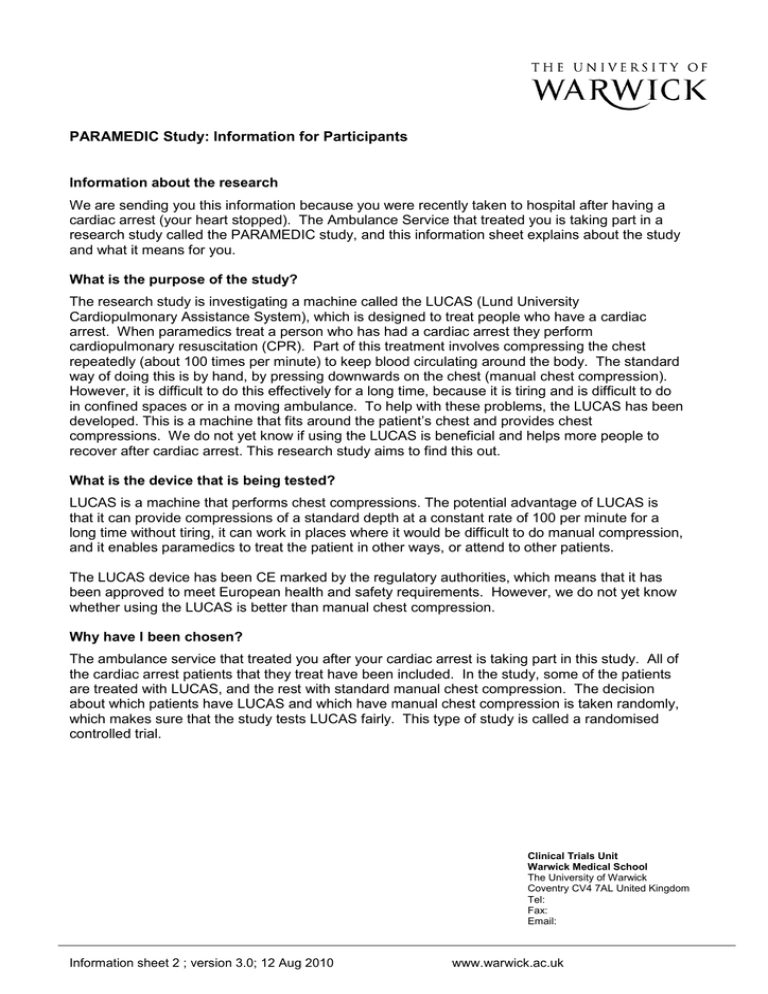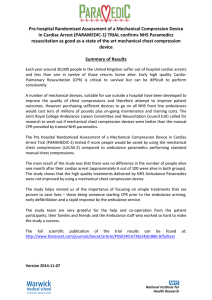PARAMEDIC Study: Information for Participants
advertisement

PARAMEDIC Study: Information for Participants Information about the research We are sending you this information because you were recently taken to hospital after having a cardiac arrest (your heart stopped). The Ambulance Service that treated you is taking part in a research study called the PARAMEDIC study, and this information sheet explains about the study and what it means for you. What is the purpose of the study? The research study is investigating a machine called the LUCAS (Lund University Cardiopulmonary Assistance System), which is designed to treat people who have a cardiac arrest. When paramedics treat a person who has had a cardiac arrest they perform cardiopulmonary resuscitation (CPR). Part of this treatment involves compressing the chest repeatedly (about 100 times per minute) to keep blood circulating around the body. The standard way of doing this is by hand, by pressing downwards on the chest (manual chest compression). However, it is difficult to do this effectively for a long time, because it is tiring and is difficult to do in confined spaces or in a moving ambulance. To help with these problems, the LUCAS has been developed. This is a machine that fits around the patient’s chest and provides chest compressions. We do not yet know if using the LUCAS is beneficial and helps more people to recover after cardiac arrest. This research study aims to find this out. What is the device that is being tested? LUCAS is a machine that performs chest compressions. The potential advantage of LUCAS is that it can provide compressions of a standard depth at a constant rate of 100 per minute for a long time without tiring, it can work in places where it would be difficult to do manual compression, and it enables paramedics to treat the patient in other ways, or attend to other patients. The LUCAS device has been CE marked by the regulatory authorities, which means that it has been approved to meet European health and safety requirements. However, we do not yet know whether using the LUCAS is better than manual chest compression. Why have I been chosen? The ambulance service that treated you after your cardiac arrest is taking part in this study. All of the cardiac arrest patients that they treat have been included. In the study, some of the patients are treated with LUCAS, and the rest with standard manual chest compression. The decision about which patients have LUCAS and which have manual chest compression is taken randomly, which makes sure that the study tests LUCAS fairly. This type of study is called a randomised controlled trial. Clinical Trials Unit Warwick Medical School The University of Warwick Coventry CV4 7AL United Kingdom Tel: Fax: Email: Information sheet 2 ; version 3.0; 12 Aug 2010 www.warwick.ac.uk Do I have to take part? It is not possible to ask people whether they want to take part before treatment starts, because treatment has to start immediately to keep their blood circulating. All the patients treated by the ambulance services taking part in the study are automatically included, and you have already had the treatment that you were allocated to. At this point we are asking for your consent to continue participating in the study, which will involve monitoring your health for about a year after your cardiac arrest. What will happen to me if I continue to take part? You have already received treatment for your cardiac arrest, so no further treatment will be involved. A research nurse will contact you to ask if you would like to discuss the study, either on the telephone or during a visit to your home, before making your decision. If you decide to continue in the study, a nurse or Paramedic will visit you twice, about 3 months and 12 months after your cardiac arrest, to make some assessments of your health and ask you to complete a short questionnaire. This is so that we can find out if the different methods of chest compression affect people’s recovery over the year following their cardiac arrest. We estimate that the 3 month visit will take approximately 45 minutes and the 12 month visit approximately 30 minutes. What are the possible risks and benefits of taking part? Any benefit or risk to you from taking part in the study will already have occurred. The only disadvantage of continuing to be part of the study is that it will require a modest time commitment to complete the follow-up questionnaires and assessments. What if something goes wrong? It is extremely unlikely that anything will go wrong as a result of taking part in this study, because treatment for your cardiac arrest has already finished. However, if you feel that you have been harmed during your treatment due to someone’s negligence, then you may have grounds for a legal action against the relevant NHS Trust (Ambulance Service or Hospital) or the University of Warwick, but you may have to pay your legal costs. What happens if I have any questions, concerns or complaints about the study? If you have any questions about the study it or concerns about the way it has been carried out, you should contact the Study Co-ordinating Centre [contact details below], who will do their best to help you. If you are unhappy about an aspect of your treatment and wish to complain formally, you can do this through the NHS Complaints Procedure. Will my participation in the study be kept confidential? Any information which is collected about you during the course of the study will be kept strictly confidential and will only be seen by authorised staff involved in the study and people from regulatory authorities who ensure that studies such as this are carried out correctly. All of them will have a duty of confidentiality to you as a research participant. Information that is used in the study will include relevant parts of your medical records from Ambulance Services. All data will be transferred to the Study Co-ordinating Centre at the University of Warwick using secure methods that ensure that there will be no accidental disclosure of personal information. Because we need to contact you during the year after you leave hospital, the Study Co-ordinating Centre will need to keep records of your name and address and other contact details. The NHS has a central register of patients, which we will be using to keep in touch with you, and which will let us know if you leave the NHS. Any information about you will be used only for this study and will not be given to anyone else. You have the right to see your personal health information Information sheet 2 ; version 3.0; 12 Aug 2010 www.warwick.ac.uk related to the research study, but you will not be able to review some parts of the information until after the study has finished. When any information from the study is published it will contain no personal information and it will not be possible to identify any individual. The data from this study will be kept for at least ten years after its conclusion and may be used in other research studies. If it is used in this way all personal identifiers will be removed and it will not be possible to identify any individual. What will happen if I don’t want to carry on with the study? You are free to withdraw at any time if you wish. If you withdraw, we will not collect any more information about your health, but the information about your cardiac arrest and treatment up to that point will still be included in the analysis of the study. What will happen to the results of the research study? The study is expected to take up to five years. The study results will not be available until at least 2014. The results will be analysed and published in a medical journal. They will also be available from the study website. If you would like a copy of the published results, please contact the study Co-ordinating Centre (contact details below). Who is organising and funding the study? PARAMEDIC is being organised by a group of doctors and scientists led by Dr Gavin Perkins and Dr Simon Gates, who work at the University of Warwick Medical School. Three Ambulance Services are taking part in the study; the West Midlands Ambulance Service, Scottish Ambulance Service and Welsh Ambulance Service. It is funded by the National Institute of Health Research Health Technology Assessment Programme. The study Co-ordinating Centre is at the University of Warwick. Who has reviewed the study? All research in the NHS is looked at by independent group of people, called a Research Ethics Committee, to protect your safety, rights, wellbeing and dignity. This study has been reviewed and given a favourable opinion by the Coventry Research Ethics Committee (reference number 09/H1210/69). Contact details Ambulance Service: Name: Address: Telephone number: Study Co-ordinating Centre Address: PARAMEDIC study Co-ordinating Centre Warwick Medical School Clinical Trials Unit University of Warwick Gibbet Hill Road Coventry CV4 4AL Telephone number: E-mail: [to be added] [to be added] Study website: www.warwick.ac.uk/go/paramedic Information sheet 2 ; version 3.0; 12 Aug 2010 www.warwick.ac.uk


